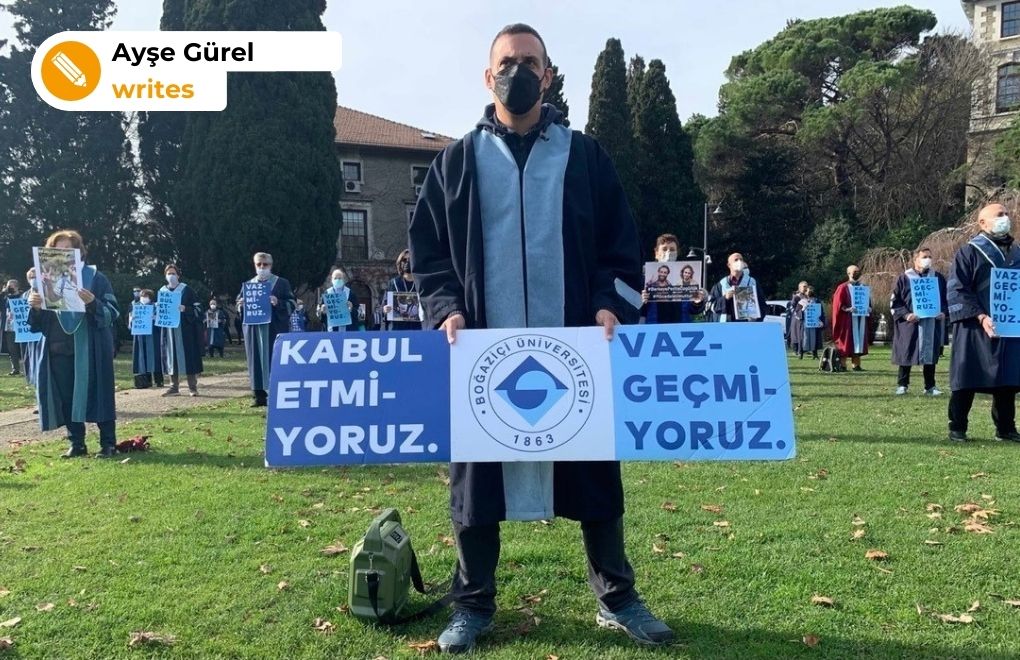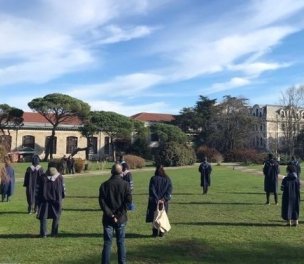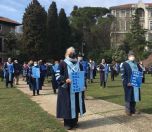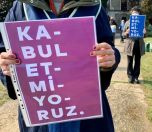* Photo: Boğaziçi Academics
Click to read the article in Turkish
Dear readers,
As you know, since January 2, 2021, Boğaziçi University, one of the most distinguished universities in Turkey, has experienced no end of troubles stemming from the Rectorate. Through the press and social media, you might have been following the damage that has been done to this institution, which is the first choice of our country’s most successful and hardworking young people, who come from very varied family backgrounds and possess very different worldviews and political leanings. Even so, I would like to recap everything that has happened here, in chronological order.
Why are we resisting?
What has happened at Boğaziçi University, a public university for the past 50 years, is the latest and most poignant example of how Turkey’s higher education system is being systematically destroyed. This article is rather lengthy but, as you read it, I think you will gain a better understanding of what exactly we —academics, alumni, students and all the stakeholders in Boğaziçi— have been objecting to, and why.
Our objective is not only to defend Boğaziçi University but, with the support of the public, to halt the project that threatens to destroy those public institutions in the country that still function well.
Why Melih Bulu?
The unrest started exactly one year ago, on January 2, 2021. This was when, by presidential decree, Melih Bulu, a name from outside the university, was appointed as rector. Bulu’s appointment was an enormous shock, since almost everyone at the university had been expecting the reappointment of the previous rector, Mehmed Özkan, who had announced his candidacy for the rectorate once more. Why was a figure like Melih Bulu chosen, despite his lack of experience and his questionable credentials?
I will not go into all the details, but I can say that Melih Bulu was appointed for exactly the same reasons that the previous rector Mehmed Özkan was not appointed. Between 2016 and 2020, despite a torrent of criticisms, hardships and pressures during his tenure, Mehmed Özkan had tried to protect our university and create an opportunity for us to continue working successfully for our institution. Bulu was sent to the university from Ankara with a “to-do list” thrust into the palm of his hand. The list included such radical and unlawful interventions to the institution that, most probably, only a figure like Melih Bulu was seen fit for the task of putting these into practice.
What Melih Bulu did as soon as he took office…
About a month after Melih Bulu's appointment as the rector, two new faculties (Law and Communication) were opened without the approval or even the knowledge of the university's authorized supreme boards.
Had the former administrations of the university ever requested that these faculties be opened? No. Was there such a project in the university’s five-year Strategic Plan? No. Did the country or Boğaziçi need the two new faculties? No. Can a rector take a decision on their own to establish a faculty and proceed to forward this decision to the country’s Higher Education Board (YÖK)? Of course not. What we do know, though, is that some people in high places in Ankara had long pondered and suggested the establishment of a law school at Boğaziçi University.
Soon after, a dean was appointed to the Faculty of Law, again from outside Boğaziçi and again by sidestepping the relevant boards within the university, and he was placed in his seat in the Senate. That was not enough though: a faculty member from Kocaeli University’s Faculty of Law was secretly appointed as the representative of the non-existent faculty and made a senator. That was how another seat in the Senate was guaranteed.
These people started to vote at the meetings. Do you know what is most disappointing? Knowledge of law does not seem to bring a sense of justice! A Law Faculty is opened illegally, and experts in law use their knowledge and experience to make plans on how to execute unlawfulness in the quickest and most ingenious way. This is unforgivable.
At this point, I should also mention the “multiple voting storm” that battered the Senate and University Executive Board (ÜYK). First of all, for those who may not know, let me explain: The Senate is the highest academic body in a university. The most fundamental decisions regarding the functioning of the university are taken here. This includes the criteria by which faculty members will be appointed or promoted. Likewise, the University Executive Board is where high-level decisions of the university are taken.
Many important issues are decided here, from the university’s budget to dormitory fees, student affairs, the decision to appoint a faculty member to associate- or full-professorship, to short and long-term academic appointments. To ensure that they could vote in the way they wanted and pass the decisions they desired, the new power-holders resorted to some outrageous tricks: while two seats on the Senate were assigned to the representatives from the Faculty of Law established overnight during the time of Melih Bulu, the three vice-rectors in Bulu’s administration —Naci İnci, Fazıl Önder Sönmez and Gürkan Kumbaroğlu— grabbed positions as acting dean or director of, for instance, another non-existent school, the Faculty of Communication, as well as of the Faculty of Engineering and the Institute for Graduate Studies in Sciences and Engineering, and the Institute of Social Sciences. All this to gain extra votes in the Senate and the Executive Board...
Simultaneously, administrative staff began to be uprooted. The most obvious indications of these were the appointment of people from outside the university to such key positions as the General Secretariat and the Directorship of the Personnel Department, as if no one in the university was eligible for these posts. Meanwhile, the most experienced branch managers were deliberately demoted to second- and third-degree positions.
Terrorizing the campus
Between January and July, Melih Bulu, his vice rectors, and the well-connected Secretary General, who was appointed by the very highest authorities in Ankara, turned the campus into hell: security cameras were installed all around the campus; the number of private security guards, undercover and uniformed police officers increased dramatically; police vehicles were waiting in ambush; there were tomas (water cannon vehicles), and mysterious persons would get out of eerie black official vehicles and enter and leave the rectorate. Rector’s advisors would walk around the campus with an air of “we own this place”. But the most terrifying practice of this new administration was the violence perpetrated against students.
The private security guards and police inflicted violence on students, who were admitted into this university thanks to their hard work, and who were using their right to peaceful protest to try to protect the campus, which they see as their home, as well as the university and its principles; students were literally dragged along the ground in the campus, detained and arrested. Such brutality inflicted on our students reflected the administration’s approach to our students and proved that this new administration would sacrifice anything for the sake of attaining their catastrophic goals.
In this context, three dates in particular have left a black mark on the history of our university and indeed of the entire country: January 4, 2021, when the security guards handcuffed the entrance gate to the university to lock the protestors out, and February 1 and July 3, 2021, when our students were subjected to violence and taken into custody.
Melih Bulu is dismissed
What happened next? Melih Bulu was dismissed from his post. Date: July 15, 2021. My guess is that, when trying to damage the institution, Melih Bulu could not act as clandestinely and quickly as desired, so some people in Ankara decided to replace him. Even he himself could not figure out what exactly was going on. Bulu left the way he took office, that is through a decree, and he will always be remembered as the person who started the darkest period of Boğaziçi University. Was it only his rectorship that was terminated? No, I think his entire career and future were destroyed because of his personal ambitions.
With Bulu gone, İnci is the new rector
After Bulu, Naci İnci was appointed as the acting rector on July 15, 2021. Do you know what his first move was as a deputy? Terminating Can Candan’s contract! Candan is one of the most competent names in documentary filmmaking in Turkey and has been teaching in the Film Studies Certificate Program of the Department of Western Languages and Literatures since 2007. This move was so utterly unlawful that an investigation by the rectorate, which was used as a basis for Can Candan’s dismissal in mid-July, did not actually happen! The necessity of such an investigation occurred to those in the rectorate months later, only when the court asked for the investigation documents on December 29, 2021!
İnci's actions
Thus, as had happened the previous month to Feyzi Erçin, teaching part-time for years in the same program, Can Candan was prevented, unfairly and unlawfully, from giving lectures, disregarding the decisions of the department and faculty and the demands of students. In the following months, this time in his capacity as the appointed rector, Naci İnci closed the classes of Özcan Vardar, who teaches film editing, and of Seda Binbaşgil, who teaches jazz, in the same program. Still not satisfied, he banned these professors from entering the campus. It has become clear that this unbelievable decision was implemented by the security guards merely on the basis of İnci's verbal instructions, without any written official order.
There may be some who think that Naci İnci has a personal grudge against these particular faculty members, but the reality is that all professors who have voiced their objections one way or another are actually on the list. This purge was conveniently launched only against those whose positions are more fragile and whose job security is precarious.
As a matter of fact, the contract of a foreign member of faculty, clearly a member of another vulnerable group, was abruptly terminated in the middle of the semester. No reason was specified. Neither the administration nor YÖK considered the detrimental consequences of this abrupt decision on those students who took the course of this professor, whether these students were from the Mathematics Department or from other departments! These are striking examples of the damage that can be done to an institution when accountability in public administrations is disregarded.
Naci İnci opposed by 95 percent of the faculty
Prior to Naci İnci’s appointment on August 20, 2021, there was a vote of confidence by faculty members at Boğaziçi. With the support they got from within the university, seventeen professors had applied for the post of rector in response to YÖK’s call. Faculty members took part in a vote of confidence for these professors and also for Naci İnci and Gürkan Kumbaroğlu. Of the 746 full-time faculty at Boğaziçi, 82 percent participated in this vote and around 95 percent of those voting cast a vote of non-confidence for İnci and Kumbaroğlu, showing that they rejected their candidacy.
While Ankara had previously criticized the faculty of Boğaziçi for not putting up a sufficient number of candidates for the post of rector, not a single one of the seventeen eminently qualified professors, who put their names forward on time and who were supported by the broad mass of the university, was deemed suitable by YÖK. What is more, every one of these seventeen candidates had more administrative experience and academic prestige than Naci İnci. No details were given as to how YÖK went about selecting the new rector. Months have passed and we are still left in the dark; however, the reason why İnci was selected over these seventeen qualified candidates became clear in the light of what was to follow.
Shocking decisions by the new rector
With his official full-time appointment on August 20, 2021, Naci İnci realized his ambition of becoming rector. He had applied for the post of rector in November 2020, without showing the courtesy of informing faculty members of his decision, and had initially refused to believe that Melih Bulu had been appointed whereas he had not.
Throughout the first six months, he had often behaved not as a vice-rector but as the rector, conveying with his actions the belief that “I am the real rector.” Having reappointed the previous two vice-rectors, in the second half of 2021, he took possibly the most devastating decisions that have ever been taken in the history of our university.
To be honest, I had a naive belief that this new rector would learn from the mistakes made by Melih Bulu, he would keep in mind that the rector’s position is for four years, and take some steps to restore some normality and regain the trust of faculty members. After all, the rector and his two vice-rectors were faculty members who had spent years working at Boğaziçi, to which they owe their academic careers. I expected this especially from Naci İnci, who had been hired at Boğaziçi not once but twice. He had joined Boğaziçi as an assistant professor in 1994, been promoted to associate professor here in 1996, moved to a private university in 1999 but then applied successfully to rejoin Boğaziçi in 2005.
I would like here to stress an important point: The argument is constantly being made that religious academics who wanted to join Boğaziçi have not been hired, with the intimation that the university is a closed club. Those who put forward such lies would do well to note the case of Naci İnci, who was employed in the same department not once but twice. There is a lot that can be said on this point, but briefly, such accusations are leveled by people who dislike Boğaziçi’s secular attitude and its stated mission of respecting all viewpoints and ideologies rather than privileging one over the other.
To portray all faculty members at Boğaziçi as sharing a particular viewpoint or ideology is an offensive and cheap tactic, irrational and divorced from reality. Members of this institution have different viewpoints and beliefs.
Perhaps the only shared beliefs are those regarding the importance of academic autonomy and freedom, meritocracy as well as democratic decision-making and the rule of law. It is precisely because of these shared beliefs that we have zealously protected and implemented in the running of this university that our graduates who come from a wide variety of backgrounds have broken out of their molds and gone on to create change not just in Turkey but all over the world.
Students sent to prison following Inci’s complaint
Returning to the post-August administration, Naci İnci and his team continued to make serious mistakes, to carry out acts of lawlessness and injustice. The administration became if anything even more hostile towards students, faculty members and the administrative staff.
Despite the support from the very top in Ankara, the insecurity and the fear felt by the administration has become even more evident. The presence of the police on campus and the violence inflicted by police have outstripped what we saw in the first six months, and our young, bright students have been arrested, including two who were imprisoned between October 6 and January 7, 2021 following a complaint lodged personally by Naci İnci. Students have been expelled from the university and hundreds of students from all faculties have had disciplinary proceedings opened against them. You read that right, hundreds!
Faculty members in the crosswires
By attempting to launch disciplinary proceedings against students, the appointed leadership of the university have tried to put pressure on faculty members and on deans as well. In short, faculty members have been targeted just as students have. Sixteen faculty members were summoned to testify before a public prosecutor on unspecified charges. World class faculty members at this 50-year-old public institution and the brightest students in this country became dangerous persons overnight and were even linked to terrorism! These are truly regrettable developments.
The damage done to students has not been limited to legal proceedings and disciplinary punishments. Student activities online have also been censored. Faculty members barred from campus have been prevented from giving talks online as well. Whereas students had once flourished precisely because of the free and open atmosphere at Boğaziçi, they now find that many things are prohibited. Councils set up to enrich and support student life on campus no longer perform their function. For instance, there is no longer a functioning Dean of Students Office at Boğaziçi. In its place, we have a vice rector in charge of student activities who does what he pleases.
The administration is so worried about student protests that the graduation ceremony in September 2021 was held online, with comments disallowed, even though many other universities had managed to hold in-person graduation ceremonies. It is no surprise that a rectorate that has taken upon itself to directly file complaints against students to the public prosecutor would hold the graduation ceremony online.
It is not possible to write this without jumping to a comparison with the situation to the past. In 2016, Mehmed Özkan was appointed, not elected, and in the four years between 2016 and 2020, students turned their backs on him and protested during the graduation ceremony. Despite this, I personally witnessed the effort he made to hold the graduation ceremony in 2020 face-to-face, despite the ongoing pandemic. Recognizing the importance the graduation ceremony holds to students, he took extreme care to ensure students were able to come to campus, in a time when vaccines were not yet available, yet at the same time taking every possible health precaution. This was despite his knowing he would be booed by students, as he indeed was. Still, he did not shy away from greeting students during their graduation ceremony, or evade his responsibility to host them.
The list of damages goes on
You might be getting tired of this list, but the list of damages done by Naci İnci and his team goes on. The current administration is ever so fond of publicly declaring that “We are a research university”, that “We are internationally reknowned”. However, take the case of what was done to the Institute for Graduate Studies in Social Sciences (SBE), the center that coordinates graduate research in the social sciences and a key part of what has made Boğaziçi Boğaziçi. A new director from outside the university (an associate professor of law at Bakircay University, previously known as Gediz University) was assigned to the SBE using a temporary appointment according to Law 2547, with the support of YÖK.
It is extremely problematic that the SBE should be headed by an academic with no affiliation with the departments that make up the institute, someone with no knowledge of the internal structure of the institute. It is common knowledge that the reason why Melih Bulu and Naci İnci did not want to appoint the SBE director from within the Boğaziçi faculty is that the institute director has a vote in the Senate. The administration had previously blocked efforts on the part of the faculty to recruit a new director from within the university. The only reason the SBE has been able to continue to function is the system the previous director had put in place, in the years he had been in charge. The only purpose this new director seems to have is to be able to vote with the administration in the Senate.
In truth, these efforts on the part of rectorate under İnci to secure a majority in the Senate serve little purpose since the Senate itself has become redundant over the past months. An example? Take a look at the ads posted on July 16 and December 31, 2021 for two faculty positions in the newly opened Faculty of Law, which had been imposed from above.
Illegal academic job postings
Just imagine: a law school is set up overnight and without any discussion in the Senate on what departments this faculty should comprise of, which academic divisions should be set up, what criteria should be put in place for the recruitment of faculty or even what the language of instruction should be. Without any decision on the part of University Executive Board on how many academic positions should be opened, the rectorate illegally announces job postings, which turn out to be tailored to specific academics the rectorate has in mind. YÖK, whichpreviously expressed its disproval of such tailored job postings, now remains silent. The rectorate, following these job postings in July, refuses to answer questions on how applicants were evaluated or even who were hired. The university community, the Senate and Executive Board learn from these job postings that two departments, Public Law and Private Law, and eight academic divisions within them have been set up. This is how Ankara sees fit to deal with Boğaziçi.
What this administration and the institutions that have helped them in this debacle fear most of all is being reminded of the democratic decision-making process and the principles of this university by the eminently qualified academics at Boğaziçi who may not share their views. This administration, which seeks to run Boğaziçi as a fiefdom and is afraid of being reminded about meritocracy and administrative autonomy, has done all it can to achieve its ends.
Who is behind this plan?
Deans have been appointed for the newly-opened faculties and have taken up positions on the Senate. Vice-rectors have cast multiple votes in the Senate and University Executive Board, using their additional appointments as acting deans. Those who have been actually elected heads of institutes have been prevented from assuming their positions. The elected dean of the Faculty of Engineering has seen their appointment blocked by YÖK. The three elected deans have faced constant intimidation. And now we have a new institute, opened despite departments asserting that it is unnecessary. You have no doubt heard about how a new “Institute for Data Science and Artificial Intelligence” was set up on December 30, 2021.
Was such an institute needed? Simply put, no. Aren’t there faculty members at Boğaziçi working in the areas of Data Science and Artificial Intelligence? Of course, and several at that. A new head for this institute will be appointed in the coming weeks and will have a vote in the Senate. One only has to take a look at the staff who are likely to be hired to understand who is behind the plan for the setting up of this institute.
What this boils down to is this - The real plan is to open the doors to the hiring of unqualified faculty members. A second tool that is being employed are the international bursaries enabled by Law no. 1416. The Ministry of Education (MEB) and YÖK have sent a large number of students abroad, without the knowledge or approval of the university, to complete their doctorates with the guarantee that they will be hired by Boğaziçi upon their return. The plan is to hire these fresh doctors without them being subject to the rigorous and transparent evaluation process that every faculty member hired at Boğaziçi goes through. The first such appointment was made by Naci İnci in November and further appointments are planned.
Are there no faculty members at Boğaziçi who studied abroad with this 1416 bursary? Of course there are. However, every one of these was hired by Boğaziçi after an extensive evaluation process, which among other things, verified that they satisfy the rigorous academic quality requirements laid down by the Senate. If a university is denied the right to choose its own faculty, you can no longer expect it to maintain its quality standards. A second question is why these doctoral scholarship holders are to be placed not in those public universities that have vacant faculty positions, but in Boğaziçi. Recent years have seen the opening of hundreds of universities in different parts of Turkey in a hasty and unplanned manner, and many have a large number of open faculty positions. Why is it that these bursaries are given not to them but to Boğaziçi? I am sure you now can guess why.
Pressure on administrative staff
The list of damages goes on. Please read on to see the full picture of what has been done. A new general secretary appointed by Ankara, who has been instrumental in stirring up violence in incidents involving students, is also being investigated for having plagiarized parts of both his master’s and doctoral theses.
However, a ban has been issued on reporting on this review into plagiarism in the two theses of the general secretary, written in Turkish. This same person was nevertheless promoted to Associate Professor by YÖK and the Inter-University Council (ÜAK). One can only wonder what purpose YÖK continues to serve when there is such a contradiction between YÖK’s statements and its actions. There are still a few distinguished academics serving on the YÖK council - will they all continue to remain silent?
The pressure on the administrative staff that started under Melih Bulu has continued apace. Naci İnci and his team have promoted to senior positions staff members who share their ideology, even when they have been unqualified. If it were not enough that the general secretary is from outside the university, he has brought in an assistant from outside the university as well. This new subordinate has been heard saying “We are here to clean up this university.” These statements are not only wholly inappropriate but also constitute grounds for criminal complaint and should be investigated. The administration should clarify to the public what kind of ‘clean up’ is going to take place so that the university can know what dangers await. This general secretary and his team seem to be so drunk on power that they have transferred administrative staff around, often on a whim. At times, it is unclear who is running the university, the rector or this general secretary.
The administration is determined to have its way
You might know that there are numerous commissions and councils within a university. Members of these were previously appointed by either the Senate or the ÜYK, but for the past year appointments have been made directly by the rector. The last such appointment was to the External Academic Relations commission. Why? Simply because the administration cannot bear to see members who do not share their views on any of these commissions.
This commission is tasked among other things with identifying partner universities abroad for academic exchanges. The rectorate has staffed this commission with its own team and the results have been predictable. The last few international agreements signed have all been with mediocre universities with little academic credibility.
The show of strength on the part of Naci İnci and his team has also directly affected the teaching standards of Boğaziçi. Departments can no longer prepare their own course programs. The course program for the fall 2021 semester was changed unilaterally by a vice-rector,
Three days before the semester was due to begin, simply to get a pat on his back from YÖK, who had issued a proclamation asking that “Universities move to a hybrid model” during the pandemic. Some courses were made online, some face-to-face and some hybrid, without rhyme or reason. The Senate was bypassed and no effort was expended to ensure the necessary infrastructure was in place. The student dormitories were opened to full capacity, with students often living six to eight to a room. This vice-rector took it upon himself to direct how courses were to be given, as if experienced faculty members at this 158-year-old institution were not to be depended upon to decide how these courses should be taught. This was a truly shameful initiative on his part.
I have been at this university for thirty-three years in all, first as a student and later as a faculty member. I was ashamed to see the vice rector stoop to recording whether or not faculty members showed up to their classes. What happened next? Novel coronavirus (COVID-19) cases rose in a small campus, not designed to accommodate a large number of students in pandemic conditions. Consequently, students asked for the option to participate online in courses which were being taught face-to-face. Thus, this plan on the part of the vice-rector, put into action despite the objections of all the departments, ended in a total fiasco.
Meeting minutes no longer published
Many of the important decisions listed above have been taken unilaterally by the rector, his vice-rectors and the general secretary. The most damaging of the changes introduced is that the Senate and the University Executive Board (ÜYK) no longer convene regularly. Previously, the Senate would meet once a month and ÜYK once every two weeks, as per a schedule determined months in advance. Under the Naci İnci administration, this is no longer the case. These organs now meet when İnci pleases, agenda items he deems fit are discussed and those he doesn’t want to take up are ignored. The uncivil language and the attitude of the rector and his team to the members of the Senate and ÜYK, on the rare occasions they do meet, are heart-wrenching. In another shocking development, the minutes of these meetings are no longer posted after the meetings have taken place.
I cannot end without touching on another important point. We have learnt that the administration is planning on participating in meetings for accreditation and external review under the umbrella of the Higher Education Quality Council (YÖKAK). This is truly incredible: I participated in this activity between 2019-21 and know the details of this accreditation process. This is an administration that has hired faculty members illegally, bypassed the Senate and the ÜYK, overruled faculty members and departments when it comes to course plans, sent its students to jail, tormented students with trumped up disciplinary proceedings, put pressure on deans to punish students with disciplinary punishment, refused faculty members entry into campus and brought in administrators from outside under the 40b provision for transfer appointments. For such an administration to spend time working towards a YÖKAK submission is preposterous.
Can a university that has silenced its faculty members and students aspire to quality? For an administration that has functioned without any sense of responsibility to its faculty members and students to seek accreditation on the basis of the success of these very same people is laughable. For YÖKAK to think that a university can be successful in its basic functions without being granted autonomy is equally disappointing.
I hope I have conveyed the story of how vested interests have, over the past year, sought to systematically destroy Boğaziçi, one of the few public institutions in Turkey that has consistently provided world class education to a large number of students without regard to their economic means. Like so many of us who have devoted their lives to this university, a shared treasure for the people of our country, I deeply regret all that has happened over the past year. I strongly feel that the administration and those supporting it ought to be called to account to the people and in particular to the youth of this country. I hope this long article has succeeded in communicating to the public the damage done to this university over the past year.
With thanks and best wishes...
(AG/RT/SD)
* PS. The article was originally published on bianet Turkish on January 3, 2022. By the time this English version was completed (February 5), the three elected deans had been removed unlawfully from office by the YÖK upon the request of the rector, Naci İnci, using the excuse of disciplinary investigations launched against them.
** This article has been translated from Turkish into English by Asude Küçük, Mohan Ravichandran and Nazım Çapkın.















